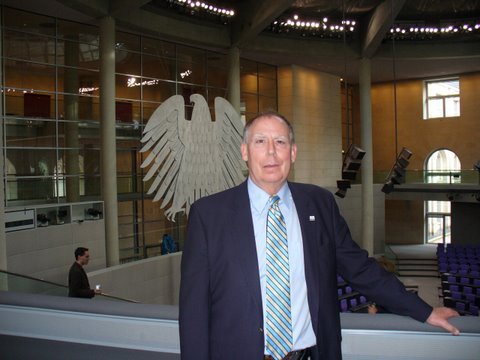By Mark Hansel
NKyTribune managing editor
The word “interim” can mean many things.
For some, it is an audition for a permanent position. For others, it is a placeholder role until someone is chosen to fill the position.
To Dr. Keith Bird, Chancellor Emeritus of KCTCS, and interim president of Gateway Community & Technical College, it is neither.
Bird said he has no interest in being considered as a permanent replacement for Ed Hughes, who retired in September after 15 years as president of Gateway. He also did not come to Gateway just to fill a seat until the new president is chosen.
He sees his role as a bridge to the next administration.
“I did not come up here as a caretaker,” Bird said. “I came up here, first of all to basically deal with some opportunities that were presented to me.”
Those include working with employers to build business engagement and recruitment at all levels, and to create some real changes in how Gateway uses data. Bird basically wants to take a really close look at most every aspect of operations.
“That’s been my job for the last six-and-a-half years,” Bird said.
“Since I have been here, I have not met anybody who has not been supportive of what Gateway is and could even be more of, in terms of an asset to this community. There are a lot of innovative things that are going on and that we need to do as part of continuous improvements.”
Bird, 70, served as the first chancellor of KCTCS, which is the Kentucky Community & Technical College System, and was named chancellor emeritus in 2009. Most recently, he served as Senior Policy Fellow for Workforce and Postsecondary Education at Corporation for a Skilled Workforce in Ann Arbor, Michigan.
For a more detailed bio of Dr. Bird, click here .
“I came here on an accreditation trip,” Bird said. “In two days, it’s incredible what you learn about an institution, but then you start layering that out and as people get a chance to know you, you learn even more. To me, an interim president should be someone who is taking very good notes and observations.”
His goal is to provide a guide for the next president and he recognizes that anything he does that might be considered a major change would be subject to review.
“I always felt that a lot of the interims that we have had, for example, could have done a lot more to prepare the way,” Bird said. “So I want to live up to my own observation.”
Bird’s wife, Nancy Laprade, is a former executive director of the Kentucky Workforce Investment Board. She continues to live in South Carolina while Bird is in temporary housing in Northern Kentucky.

He admits the reports of infighting at Gateway in the months leading up to Hughes’ decision to retire were a bit disconcerting for both him and his wife.
He said, however, that he has not witnessed any discord since his arrival.
“Since I have been here, I have not met anybody who has not been supportive of what Gateway is and could even be more of, in terms of an asset to this community” Bird said. “There are a lot of innovative things that are going on and that we need to do as part of continuous improvements.”
He calls Gateway one of the best kept secrets in this area and would like it to be less so. He believes one of the challenges is managing expectations at an institution that, by comparison to some of its peers, is still in its infancy.
“At Gateway, when I look at participation rates from all of the high schools in this area, they do not know what Gateway is yet,” Bird said. “We’ve got a lot of work to do with just manufacturing alone and that has generated a lot of attention because it’s a major need.”
The biggest roadblock to developing an advanced manufacturing workforce to fill the high-paying jobs available in the region continues to be convincing students and their parents of the changes in the industry.
“At Gateway, when I look at participation rates from all of the high schools in this area, they do not know what Gateway is yet. We’ve got a lot of work to do with just manufacturing alone and that has generated a lot of attention because it’s a major need.”
Bird said that was really brought to the forefront during Gateway’s “STEM Days” which provided opportunities for students and parents to see what a 21st century career in advanced manufacturing is all about.
The exposure to the highly technical, safe and clean environments of today’s advanced manufacturing jobs is a real eye-opener.
“If we can get parents to go to a factory like Mubea, as well as give them orientation on campus, it makes a big difference,” Bird said.
The requisite skills needed for advanced manufacturing positions can be obtained in just a few years at a fraction of the cost of a four-year degree. In many cases students can become eligible for internships or apprenticeships that allow them to earn while they learn as well.
“When I first came here, a colleague told me he spent all of this money to send his son to a four-year college and now he is working (in advanced manufacturing) and he’s making $85,000 a year,” Bird said. “These companies value employees not only for their skills as technicians or operators, but above all for their ability to think.”
One of the biggest challenges facing Gateway is declining enrollment, but Bird said there are opportunities to reverse that trend.

He believes Gateway must continue to work with the schools to provide a student pipeline, but should also consider other avenues to expose people of all ages and skills sets to the educational opportunities that are available.
“We used to talk about leave no child behind, well really we need to look at it that we can leave no potential worker behind, with where we are in a globally competitive world,” Bird said. “If we can build out that whole experiential learning to a much greater degree, we will be where we want to be.”
He would like to see Gateway doing more programmatic accreditation in some of the technical areas.
“We need to make all of our classes incorporate the principles that we now know are best practices,” Bird said. “Bringing people in as a cohort and having a very specific programmatic length. Then everything they do, I don’t care under what environment, can be converted into credit that applies toward a higher degree, either at Gateway or another institution.”
Gateway is a bit unusual in that its ratio of male-to-female students is about equal and Bird thinks that provides another opportunity to increase enrollment. Female students generally tend to outnumber male students.
“My first guess is that we have a lot of technical programs and they tend to be more male-oriented, not that we are not doing everything we can to get women in STEM programs,” Bird said. “If that’s true, and the work we are doing now will help show that, we know we have a strong allied health, so we then need to determine what other signature programs Gateway needs to develop to attract female students.”
Gateway has tools that can help it identify those programs, Bird says it just needs to find out how to best utilize them.
“We have a really good program alignment and software tool that will allow you to basically take a lot of the existing commercial sources and what the needs are and link it up to what your program offerings are,” Bird said.
Bird realizes these are ambitious goals for someone who, by his own admission does not plan to be at Gateway for the long term. He said that will not inhibit him from moving forward with his vision for Gateway and encouraging faculty and staff to offer input.
“It is all right and it is necessary to ask why we are doing things a certain way and that shouldn’t be seen as criticism,” Bird said. “You can get behaviors started and you can get processes in place (without that) and right now there is enough going on that we’ve got to really deliberate about everything we are doing. In fact, the budget is going to force us to do that.”
Bird assumed the interim role Oct. 1, with a six-month commitment that will be extended on a month-to-month basis until a new president is hired.
The plan is to advertise for the position no later than January and Bird expects Gateway will have a new president in place by July.
Contact Mark Hansel at mark.hansel@nkytrib.com

















